
Just the other day, my friend and colleague Michael d'Estries (who runs the celebulicious Ecorazzi, and also Groovy Green, and also Ecorattle ) started a new site, Veg Daily (which he runs with partner Michael Dudell who is an eight-years-and-going strong vegetarian). Michael made the switch to a vegetarian diet about six months ago and says he'll never go back to his meat-eating ways. "I think what works for me is the tasty faux-meat alternatives that are now available. Faux chicken nuggets rule!"
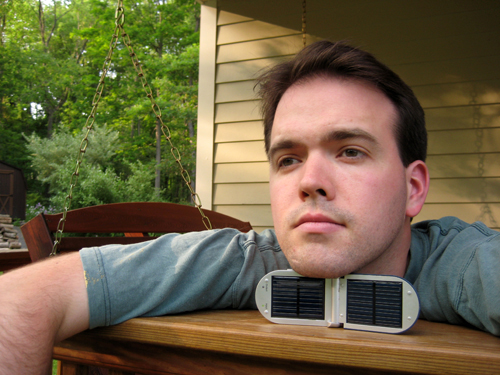
Michael d'Estries
As a 16-year veteran of the veggie life (half my time here on Earth!) and publisher of Eco Chick and editor of Greenopia, I've written literally hundreds of blog posts, magazine articles, and done radio and TV interviews talking about the virtues, enjoyments and practicalities of living a greener life.
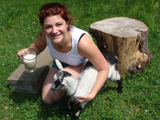
Starre Vartan and Amelia the goat
And the one thing I've picked up from all my research and writing (my undergrad degree is in science and love to delve into nutrition/climate/enviro sci studies) is that a vegetarian diet is the single simplest thing you can change in your life to leave a smaller footprint on the Earth (21% of global CO2 emissions come from livestock). It doesn't involve buying new gadgets or redoing your home, installing anything or require any more work. Vegan is even better! And minimizing meat consumption to once or twice a week, and choosing local/organic, non-tortured animals when you do is a pretty darn good step too. I always say that if everyone in America ate half as much meat, that would be like 50% of our population being vegetarian- that is a very reachable goal.
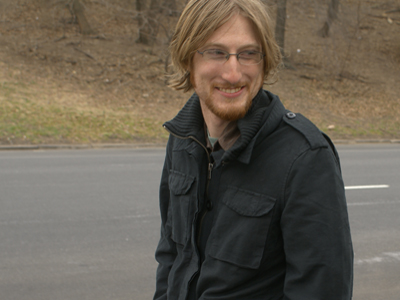
Brian Clark Howard
Turns out plenty of my fellow green bloggers follow their own suggestions for living a greener life and are veg or almost so, which is encouraging; I think that once you know the realities of your impact, it's hard to be a hypocrite. Brian Clark Howard, born and raised in the midwest, comes from a meat-loving family that even adds bacon to their veggies! Longtime editor at E/The Environmental Magazine and now editor at Hearst's The Daily Green, these days he chooses mostly vegetarian options, though he does allow for some flexibility. "The more I've learned about the environment and factory farming the more I've cut down on meat, and I always try to choose free range, natural and organic options."
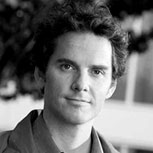
Graham Hill
Graham Hill, founder of Treehugger, was vegetarian for five years, but now eats some meat. "I am lazy and apparently able to live in denial," he says of his defection from the veg life. He says he recognizes that the issue is important, so his new plan is to be veggie during the week but take a break on weekends. "As a concept, I think this may be more manageable for the general public," says Graham. This reminds me of the NYTimes food writer Mark Bittman's own crusade to be more environmentally-sensitive with his food choices; he's a proclaimed "Vegan until six."
Matthew McDermott writes about alternative energy for Treehugger/Planet Green and was a vegetarian (for ethical and pollution reasons) for 12 years, took a break, and has been mostly vegan since 2004 (after learning how food animals contribute to global warming). "As someone who's concerned about the environment (ignoring animal rights issues) I don't think you can make an argument in favor eating meat much more than on special occasions. Cutting meat out of your diet is one of the greatest personal steps you can take to reduce your personal carbon footprint: Far greater than any 'small step' such as using CFLs, unplugging you cell phone charger, or most of the easy things we in the green media are so fond of promoting," says Matthew.
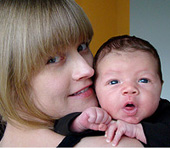
Jill Fehrenbacher and her son
Jill Fehrenbacher, a gorgeous new mother who hails from California, is the founder and editor of Inhabitat (and most recently, Inhabitots). She qualifies herself as an almost-vegan ("I eat too many non-vegan cookies to count!" she demurs). Her husband is vegan and she maintained her animal-friendly diet throughout her pregnancy, which resulted in her very adorable son. 'I've been a vegetarian for 18 years and I've never found it difficult or challenging in any way - and this is coming from someone who loves food. If you truly care about climate change and want to do something to help the environment, the SINGLE MOST EFFECTIVE thing you can do to reduce your carbon footprint is to eat less meat - especially red meat." This month's Body and Soul Magazine backs up Jill's assertion, but purely from an advice for healthy aging perspective. "A recent study found that people who consumed the highest amounts of red meat had a 20-60% higher risk of developing certain cancers," reports Jessica Cerretani.
Jill echoes my own thoughts on the issue when she continues: "This is why when I meet environmental activists who are heavy meat eaters, it blows my mind. It totally undermines your credibility as an environmentalist if you expect other people to change their lifestyles, but you are unwilling to take the necessary steps in your own life to help the planet."
You can now go online to any one of a number of sites and get nutritionally-sound advice and information, and even if you are a foodie, or eat fast food, sites like Greenopia will show you which of your fave chains offer a number of veggie/vegan options.